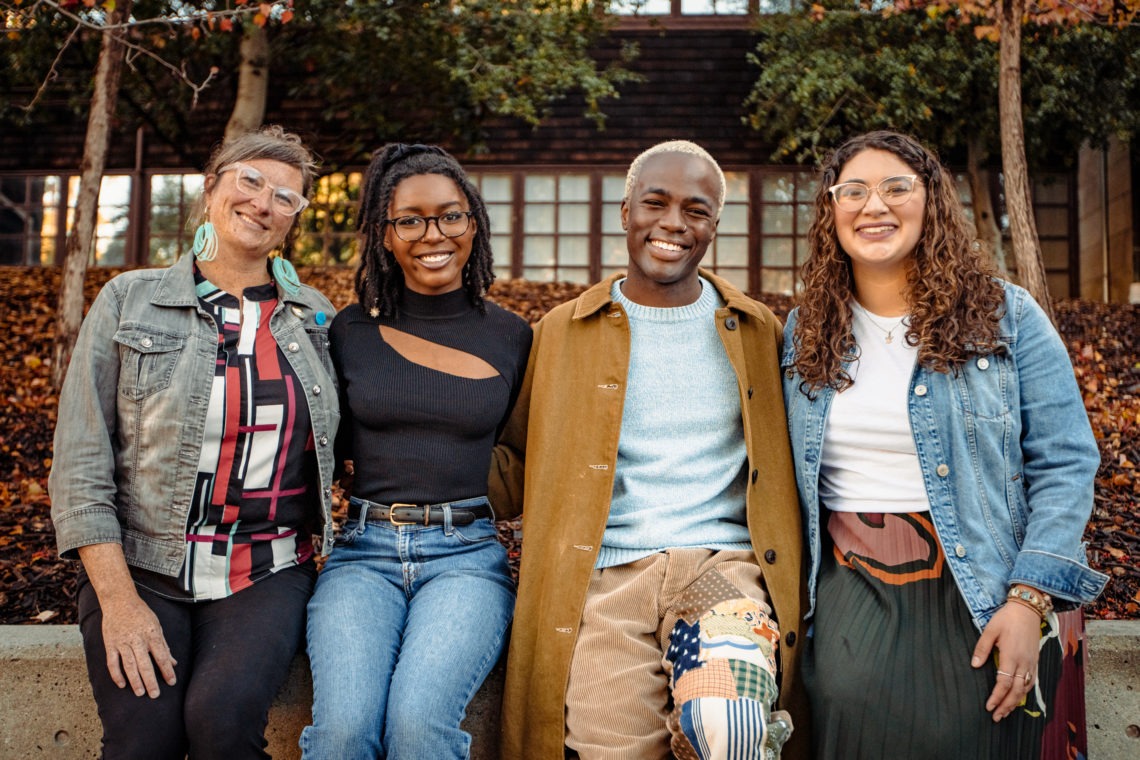
From left to right: Celeste Hamilton Dennis, Bria Suggs, Jeremiah Rhodes and Emma Garcia. Photo Buddy Terry (’23)
Berkeley Journalism introduces a new cohort of Dean’s Fellows, a leadership development initiative that fully funds first-generation college students by removing a barrier to entering the field.
The initiative, which began in 2021 through private philanthropy, counters the widespread income and access disparity in newsrooms by providing guaranteed funding for tuition and fees for up to five students annually, depending on available resources.
The Dean’s Fellowship Program enables the fellows to take jobs that serve as stepping stones to meaningful careers without the burdensome debt of their graduate studies. It also features individualized coaching, mentoring and leadership development.
“We passionately believe that who the storytellers are matters because we each see the world through the prism of our own lived experiences,” Geeta Anand, dean of Berkeley Journalism, said. “It’s been thrilling to welcome the fellows into this warm and vibrant community that we cherish so greatly.”
The program reflects the School’s priorities under Anand, who became the first woman—indeed first woman of color— to lead Berkeley Journalism in 2020. She was recently honored with a special industry leadership award from Dow Jones for her needle-moving initiatives, including advocating for change in who gets to be a journalist in this country.
This year’s fellowships are made possible by the generosity of our Advisory Board members Steve Silberstein (BA Economics/MLS) and Bill Whitaker (MJ ’78 & ’17), the Brooks-Mathews Foundation, Maureen Orth (BA Political Science/CLS ‘64), Jim Wood and Taube Philanthropies.
This year’s fellows join us from across the country: Salinas, California; Portland, Oregon; Fayetteville, North Carolina; and Atlanta, Georgia.
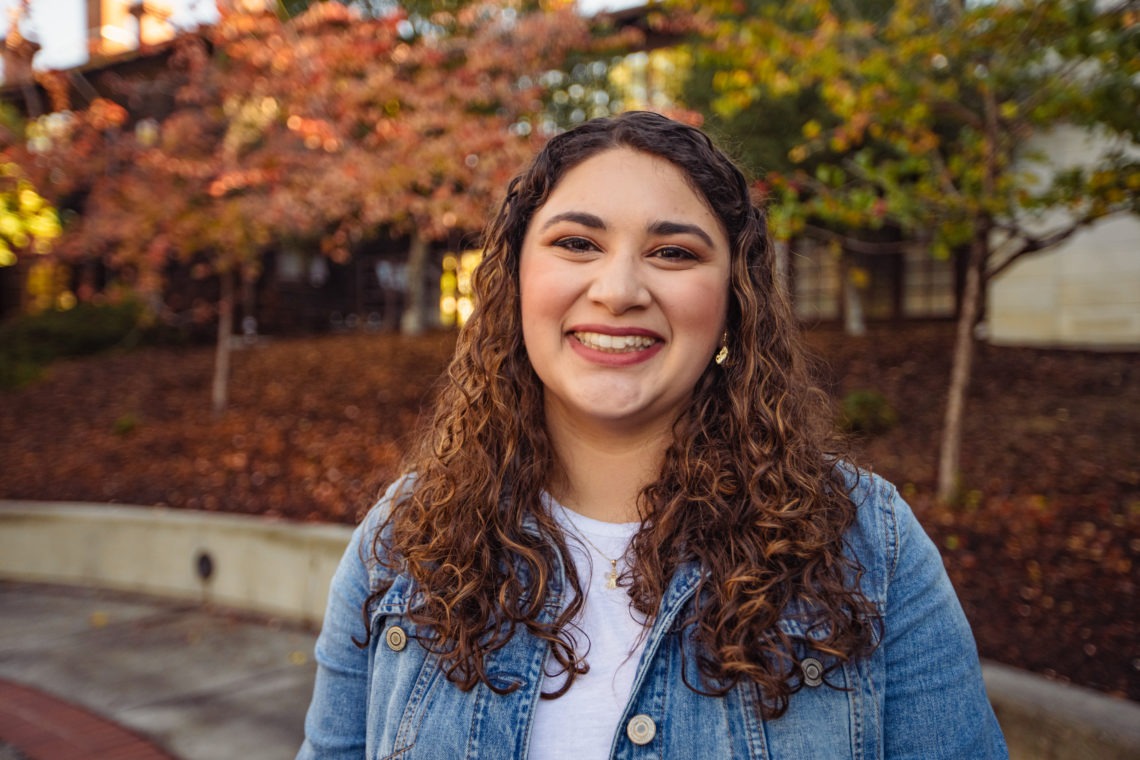
Emma Garcia (Photo Buddy Terry)
Emma Garcia of Salinas, went to California State University, Monterey Bay, where she worked at the student newspaper, covering institutional accountability around student welfare issues. She also took footage for local television news station KSBW for four years and is interested in sharpening her video skills.
Garcia is a member of the UC Berkeley chapter of the National Association of Hispanic Journalists.
“The Dean’s Fellowship has impacted me by allowing me to prove every statistic that tried to define me, wrong,” Garcia said. “Being raised in a low-income household by a single mom and being a product of the welfare system, going to college, let alone pursuing a master’s degree, were slim.”
Garcia dreamed of studying journalism at Berkeley but thought she would not be able to afford it. The Dean’s Fellowship not only made her dream a reality, but also enabled her younger brother to see the possibilities, she said.
“I’m not just another number,” Garcia added. “I’m a journalist, who will make a difference and tell the stories of people from backgrounds like mine and beyond.”
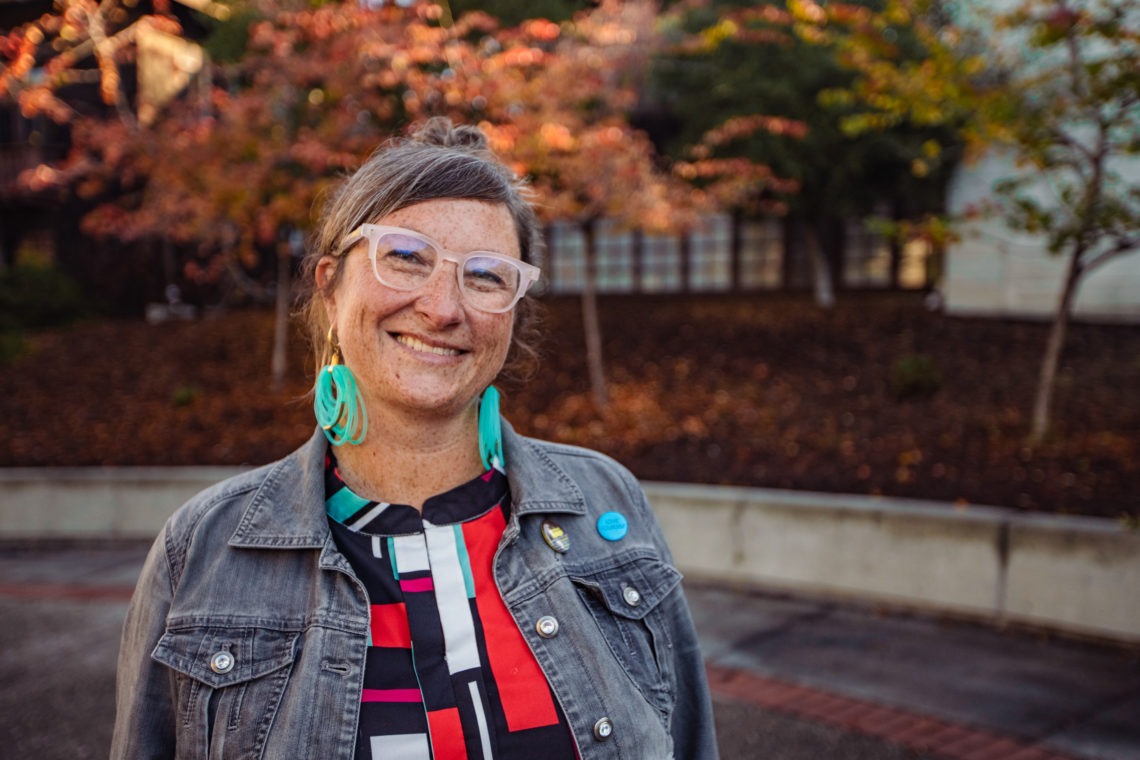
Celeste Hamilton Dennis (Photo Buddy Terry)
Celeste Hamilton Dennis grew up in Levittown, New York, and studied literature at Boston College and University College Dublin. She taught English in Guyana with the Peace Corps and worked at Idealist.org for more than a decade in the U.S. and Argentina. She plans to focus on narrative writing and enjoys examining social issues at the intersection of art, health, education and women’s rights. She moved here from Portland with her partner and two young children. She is a member of the J-Care Bears for students who have children or are taking care of family, and also the school’s Journalists Association for Mental Health.
Hamilton Dennis said the Dean’s Fellowship has shown her what’s possible for her to achieve.
“I didn’t stop dreaming when I had kids, but I stopped dreaming big,” she said. “It wasn’t until I became a parent myself that I truly understood the invisibility of women’s labor, especially growing up with a single mother who was a bowling alley waitress. These hidden stories are why I’m here. I love journalism, especially solutions journalism, because it can show communities what’s possible.”
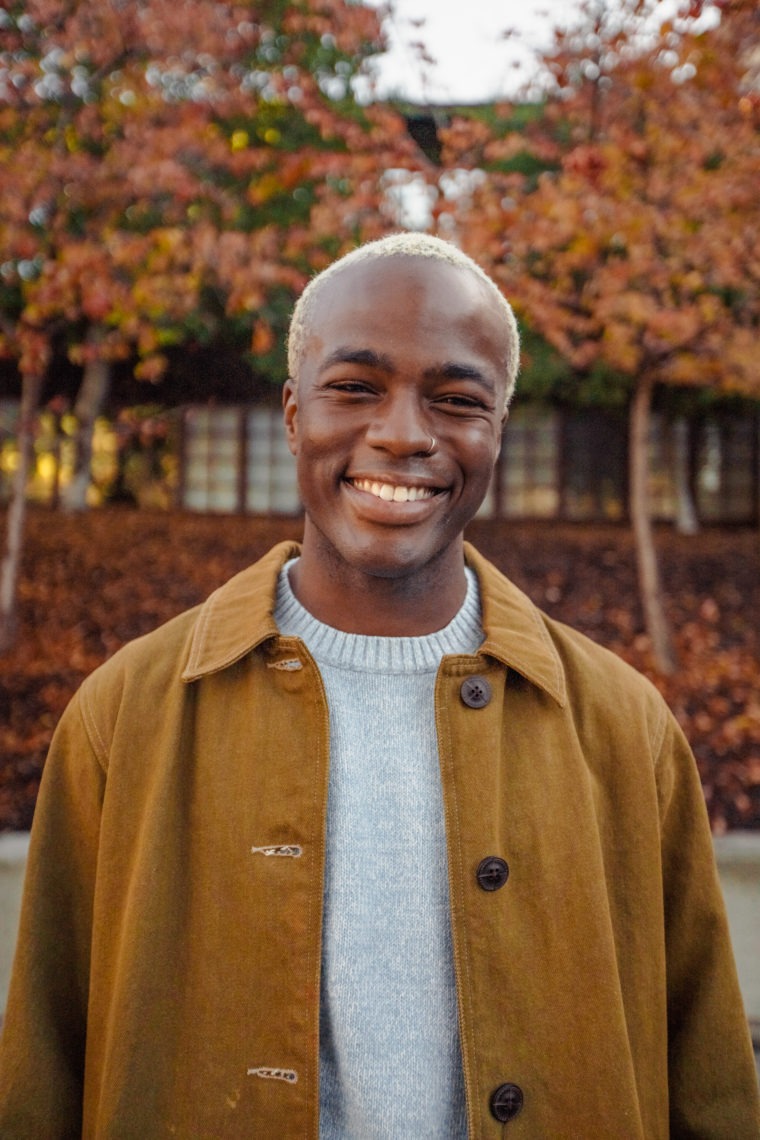
Jeremiah Rhodes (Photo Buddy Terry)
Jeremiah Rhodes is a journalist and documentary filmmaker, from various places in the South, including North Carolina. Rhodes wants to cover stories related to power — its weaponization, the ways people build and lose it, and how people are affected by it. His work has focused on race, sexuality, history and identity in the South. He hopes to expand those subject areas at UC Berkeley.
Rhodes has worked with video teams at The Washington Post, Texas Tribune, NPR, Univision and The Tennessean, among others. His work has been screened at film festivals across the country, including Blackstar Film Festival and the New Orleans Film Festival. He is the recipient of a Scripps Howard Award, National Press Photographer’s Award and two bronze awards from the 75th Annual College Photographer of the Year.
Rhodes studied photo and video journalism at the University of North Carolina at Chapel Hill and is a proud member of the National Association of Black Journalists and the National Association of LGBTQ+ Journalists.
“I’ve spent so much of my life worrying about how to reconcile the dreams I had with the cost that comes with them,” Rhodes said. “I knew that in order to become the reporter that I want to be and to do the work that I wish I saw more of, I’d need to continue my education. I also knew that the price tag on that experience would be higher than I could ever pay.”
Rhodes said he felt fortunate that Berkeley Journalism believed in him as a journalist, writer and person, to the point of investing in his future.
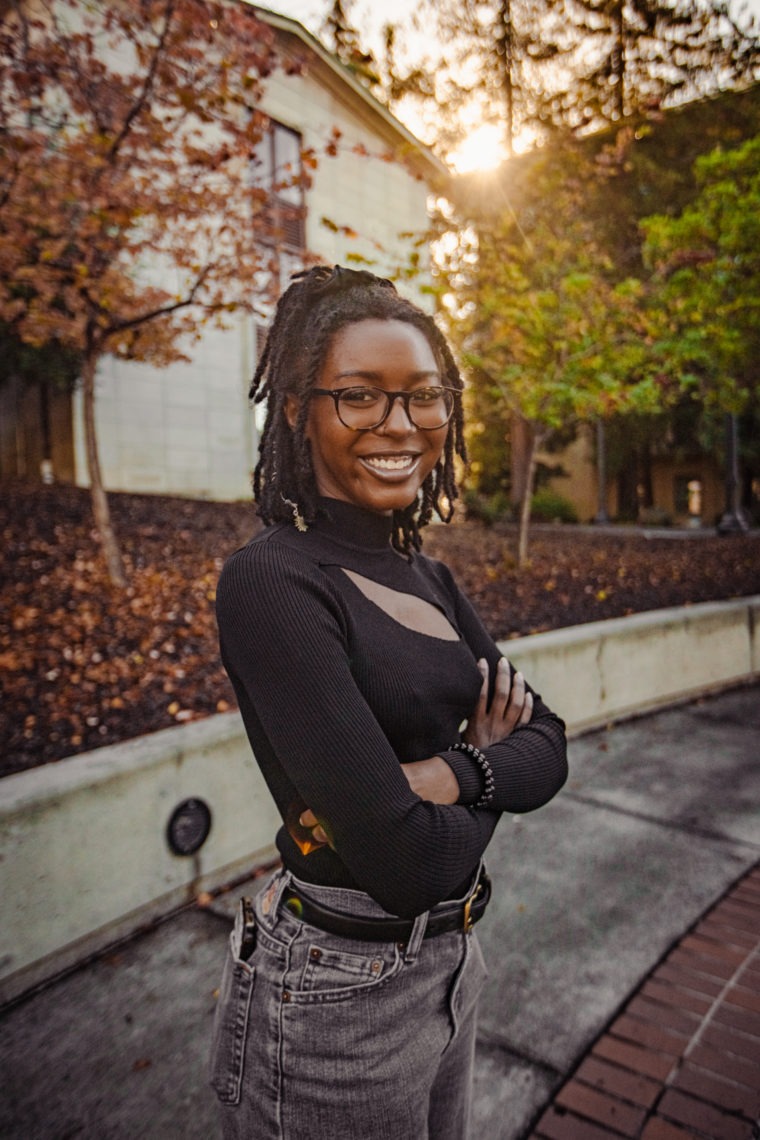
Bria Suggs (Photo Buddy Terry)
Bria Suggs is a writer, photographer and editor interested in reporting on the cultural, social and environmental issues that often disproportionately impact underreported communities.
She’s a recent magna cum laude graduate of Georgia State University, where she earned an advanced honors degree in creative writing with a minor in journalism. She was a staff reporter and eventually arts and living editor for The Signal, Georgia State’s award-winning independent student newspaper.
After graduation, Bria worked as a general assignment reporter for The Atlanta Voice, a local Black-owned publication. She had the opportunity to cover a wide array of topics, such as the Ahmaud Arbery trial, the president and vice president visiting Atlanta, as well as local Black business features. And several of her photos and articles were selected for the publication’s cover.
Suggs looks forward to refining her skills as a writer and adding some longform pieces to her portfolio. She also hopes to pursue her growing interest in audio and podcasting.
“As a woman and as a person of color, breaking into the industry can be especially difficult,” Suggs said. “I knew that for the types of jobs that I’ve always dreamt about, I would probably have to go to graduate school. My biggest barrier, however, was cost.”
Suggs said that without the Dean’s Fellowship, she would not have been able to come to Berkeley, where she hopes to set an example for her younger siblings.
“I’m incredibly grateful to Dean Anand and the staff at UC Berkeley,” she said, “because being able to attend this amazing program is an amazing gift.”
